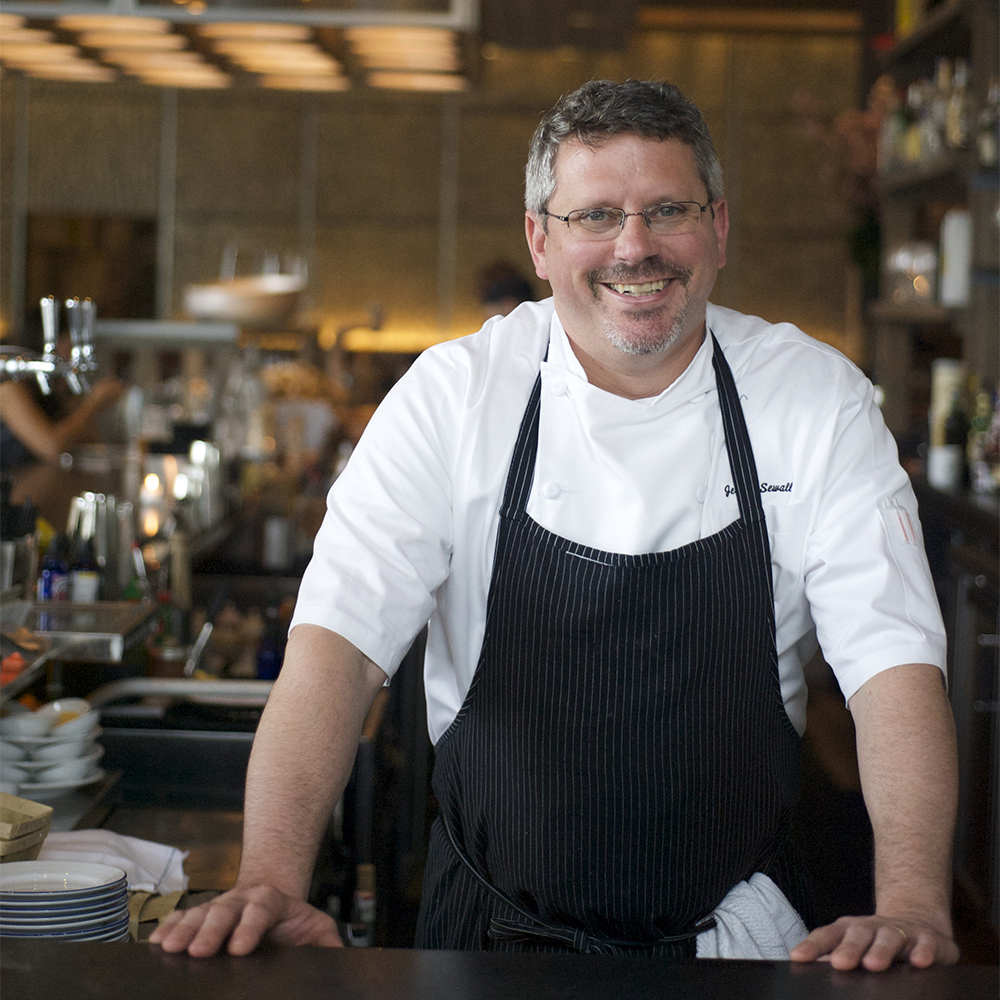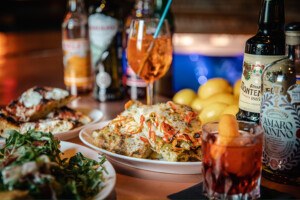Row 34’s Jeremy Sewall Talks His Debut Cookbook

Photo provided
Chef Jeremy Sewall (Row 34, Island Creek Oyster Bar, and Lineage) is set to release his first cookbook on September 30. Co-written with Erin Byers Murray (Shucked: Life on a New England Oyster Farm), The New England Kitchen: Fresh Takes on Seasonal Recipes includes over 100 seasonal recipes, a prep section covering lobsters, oysters shucking, and even curing your own bacon, and profiles of Sewall’s friends in the farming, fishing, and brewing communities.
We recently caught up with Sewall to discuss the inspiration behind his debut book, the trials of trying to write during dinner service, and how he’s attempting to reintroduce “nostalgic” New England fare to the masses.
How long have you been working on The New England Kitchen: Fresh Takes on Seasonal Recipes?
From the first conversation with Erin [Byers Murray] I ever had about the book, until it was completed, it took almost three years.
How difficult was it to juggle the workload at four restaurants while trying to write a book?
Well, Row 34 wasn’t open yet. Once the ball started rolling, I had a deadline in my mind to have most of it done before I was really getting into the pre-opening design and planning of Row 34. That was a motivator to keep my head down. Until you start this kind of project, you don’t know how difficult it can be. I was always thinking, ‘Oh, I’ll get up in the morning and write a couple recipes, and knock out some while I’m at work,’ and it never really worked out that way. Then after I started the writing process, my wife and I had a daughter. Having a new baby along with two older sons will really cut into your time. It’s such a balancing act. I couldn’t write at the restaurant because when you’re here, you’re distracted and people are looking for and you want to be in the kitchen. So, I found myself a lot at the public library writing the book. I’ve now spent more time at the library in my 40s than I ever did in my entire academic career.
Your book is called The New England Kitchen. How did you approach trying to capture the cuisine of the region?
I don’t know if I sought to capture that in the beginning. What I wanted to do was tell a little bit of a story about New England’s past and present. I don’t think there’s another region that’s more defined by its seasons. From there it flows down unto what’s available and how things grow and when things are caught and harvested. In a way, the extremes of the seasons are a blessing from a cooking perspective because it’s always changing and forcing you to be on your toes. I also really wanted to tell the story of the farmers and the fishermen and the people that are producing the food and how that applies to the restaurants.
Do the recipes in the book include dishes at your restaurants or do they cover food you’ve been creating over the span of your whole career?
It definitely covers my entire career. It’s stuff that I grew up eating like the steamers on the cover. It’s such a nostalgic thing, and I love to reintroduce food to people who are from the area. A lot of that food comes down to geography, because it does taste better when you’re sitting next to the water and near the ocean. But that was a lot of the fun for me, to say, ‘Look, it’s not original, but it’s such a great, unique thing that’s distinctly New England.’
So do you think this accessible to someone outside of New England, say somebody in the Midwest who doesn’t have the kind of access that we do to great seafood?
Yes, there are over 100 recipes and I think there’s enough variety where you might not be able to get the exact ingredients, but you’ll be able to craft it in your own regionally specific way. The recipes are very approachable. When I started writing this book, it wasn’t from a perspective of writing for chefs, but more like people such as my sister and my aunt.
Can you tell me who some of the fishermen, brewers, and farmers that you profiled?
My cousin Mark Sewall, who catches all of our lobster, was a natural fit. Besides the fact that we’re related, he has such a great story. All he’s ever done since he was a kid was catch lobster. Our grandfather was one of the original lobstermen in New York Harbor, and that’s come down through the family. His dad even lobsters a little bit. It was fun to connect that back to our family history.
We looked at Skip Bennett in Duxbury. A lot of people know ICOB and Island Creek Oysters, but they don’t know the story of how his whole company came about. They might not think about the process and how that ends up on their plate. That’s what we wanted to capture, was Skip’s commitment on the oyster farm and how important that is to what we do at the restaurants.
I also wrote about Cole Walker, who has an amazing farm stand in Rhode Island, and Dan and Dave Kleban from Maine Beer Company. My god, their product is so wonderful. I think it’s some of the best beer brewed in the country.
Overall, did you enjoy the process of writing the book? Would you write another in the future?
Did I enjoy it? Yes, I had to remind myself a few times to enjoy it because you only get to write your first book once. I didn’t want to wake up and think of it as some burden. I’m lucky to be able to get to do this. Would I do it again? Maybe someday, but not any time soon. I think I’m a lot smarter about it now, so I would know what I’m getting into. It challenged me like I haven’t been challenged in quite some time.

Chef Jeremy Sewall at Island Creek Oyster Bar. Photo Michael Harlan Turkell
You can pre-order a copy of The New England Kitchen at jeremysewall.com/cookbook.


